Advanced Manufacturing Industry Transformation Plan: Summary
Published: 13 Mar 2023A two-page summary of the Advanced Manufacturing Industry Transformation Plan.
Type
File
PDF, 769KB, 2 pages


The Government has closed the Industry Transformation Plan programme.
This webpage will be updated soon.
The Advanced Manufacturing Industry Transformation Plan (ITP) has been co-created and is co-owned by business, unions and workers, government, Māori, Pacific peoples and wider stakeholders. The plan will accelerate the growth and transformation of Aotearoa New Zealand’s advanced manufacturing sector.
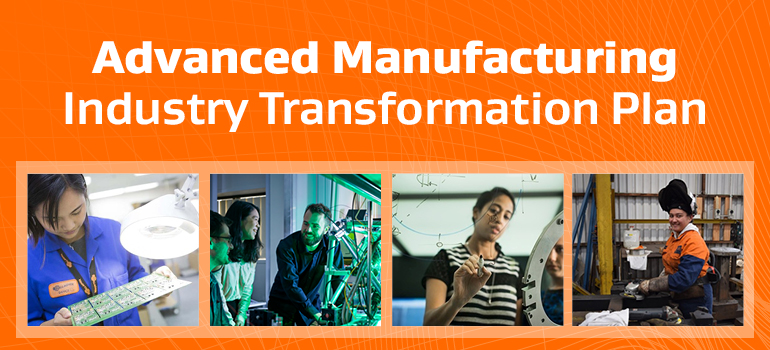
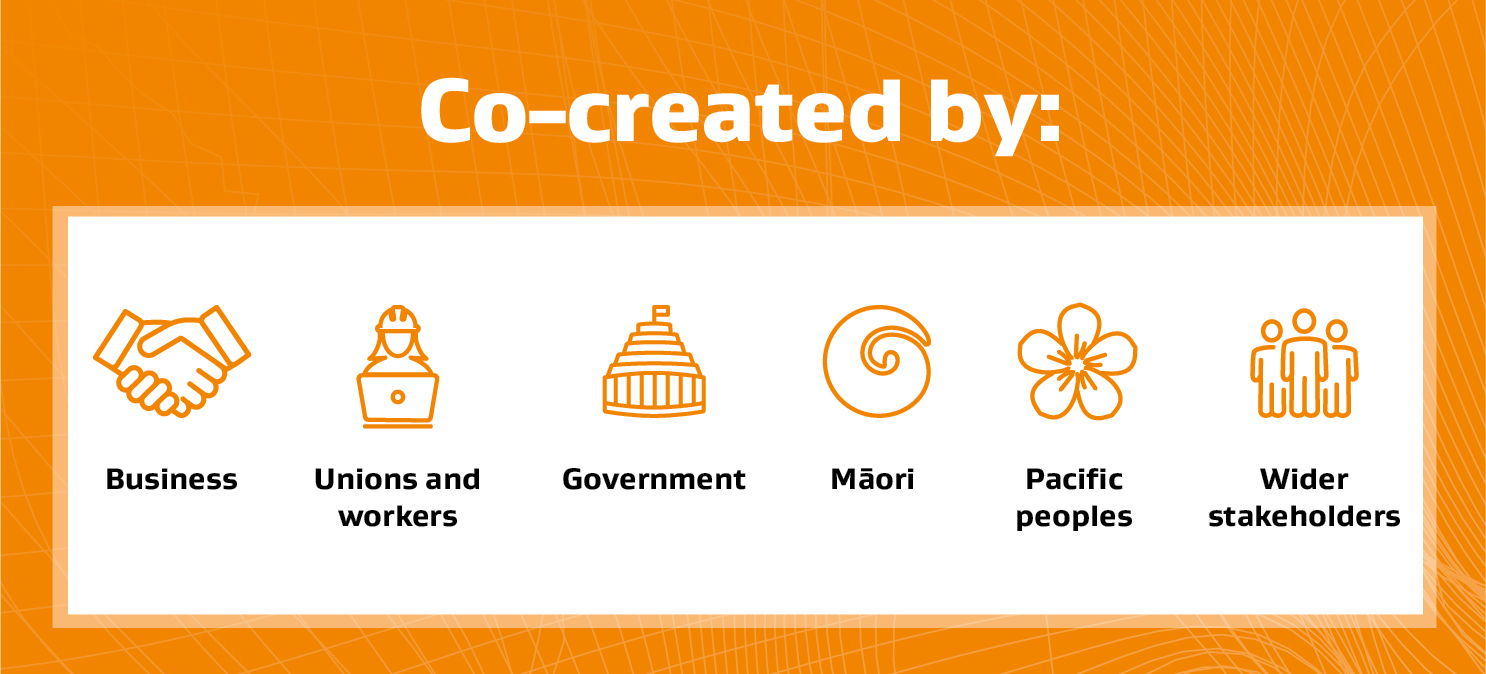
"Right now is our moment. We have an opportunity to grow and transform advanced manufacturing in Aotearoa New Zealand. A driving principle is partnership, and representatives from business, unions, government, Māori, Pacific peoples and wider stakeholders have co-created and co-own this ITP."
Tripartite Steering Group Co-Chairs
Brett O’Riley Chief Executive of the Employers and Manufacturers Association
Rachel Mackintosh Vice-President of the New Zealand Council of Trade Unions Te Kauae Kaimahi and Assistant National Secretary of E tū
Paul Stocks Deputy Secretary, Ministry of Business, Innovation and Employment
The Advanced Manufacturing Industry Transformation Plan provides an overview of Aotearoa New Zealand’s advanced manufacturing sector and an Action Plan to accelerate its growth and transformation. A summary and the full ITP are available below.
A two-page summary of the Advanced Manufacturing Industry Transformation Plan.
PDF, 769KB, 2 pages
The Advanced Manufacturing Industry Transformation Plan provides an overview of Aotearoa New Zealand’s advanced manufacturing sector and an Action Plan to accelerate its growth and transformation.
PDF, 5.2MB, 84 pages
Cabinet paper seeking to release the Advanced Manufacturing Plan.
PDF, 3.9MB, 99 pages
Cabinet agreed to release the Advanced Manufacturing Plan.
PDF, 223KB, 3 pages
The Advanced Manufacturing Industry Transformation Plan was launched by the Minister for Economic Development, Hon Stuart Nash, on 13 March 2023 at Temperzone in Tāmaki Makaurau Auckland.
The launch included feature presentations by Steering Group Co-Chairs Brett O’Riley, Rachel Mackintosh and Paul Stocks.
You can watch a recording of the event below:
Video Transcript
What is Advanced Manufacturing?
The term “Advanced Manufacturing” is used in the ITP to cover all manufacturing in Aotearoa New Zealand. This includes both primary and non-primary sector manufacturing. The term “advanced” refers to the use of modern technologies, processes and business practices in the manufacturing process rather than whether the final products are high-tech. This Advanced Manufacturing ITP therefore covers the making of products as diverse as computer chips and branded chocolate.
Implementing the plan requires ongoing commitment from all partners. The plan’s Steering Group identified a subset of actions that are being delivered first. Funding for these comes from the initial $30 million government investment to deliver the first stages of the Advanced Manufacturing ITP Action Plan.
Since the plan launched in March 2023, work has begun on 7 “early win” actions:
Another 7 actions will be underway soon:
Introducing 10 “ready to go” advanced manufacturing circular economy demonstration projects showcasing circular success, co-funded with business. This also supports: Emissions Reduction Plan 9.4 – Support Business to Move to Circular Economy Models(external link).
Upskilling 200 advanced manufacturing businesses per year to embed circular economy principles. This also supports: Emissions Reduction Plan 9.4 – Support Business to Move to Circular Economy Models(external link).
Creating an advanced manufacturing sector decarbonisation programme with the Energy Efficiency and Conservation Authority (EECA). This also supports: Emissions Reduction Plan 11.4.1 – Decarbonise Aotearoa Industries(external link).
Manufacturers throughout Aotearoa, from one-person operators to the very largest businesses, have the opportunity to contribute to transforming our advanced manufacturing sector. You can:
Advanced manufacturing is vitally important for Aotearoa New Zealand and a major contributor to the economy, jobs and communities.
This table illustrates the contribution of the 7 advanced manufacturing subsectors to New Zealand’s manufacturing GDP:
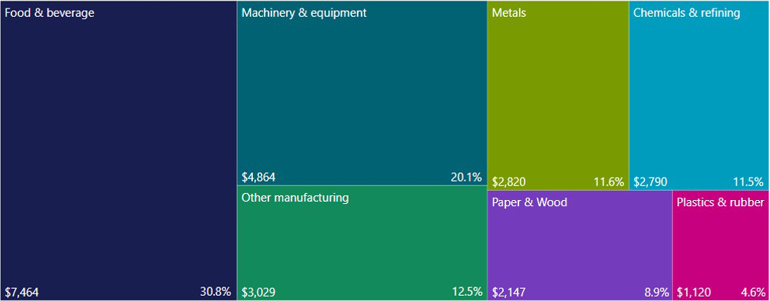
Advanced manufacturing GDP by subsector (2020) ($millions)
Text description of advanced manufacturing GDP by subsector (2020)
This chart summarises the respective growth rates of the 7 advanced manufacturing subsectors over the last 5 years:
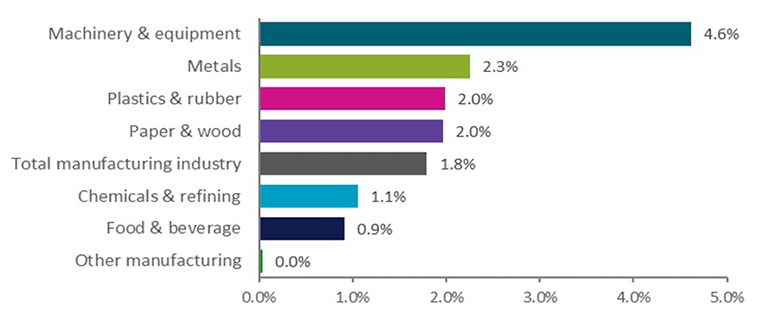
Compound annual growth rates for advanced manufacturing subsectors (2015 to 2020)
Text description of compound annual growth rates for advanced manufacturing subsectors (2015-2020)
It employs 10.7% of the workforce (248,800 people) and is the second largest employer of Māori and Pacific peoples.
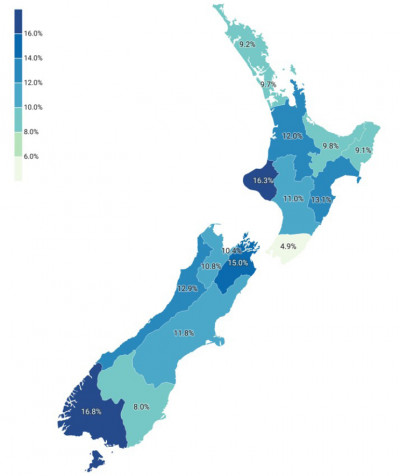
Advanced manufacturing’s share of regional employment (2021)
Advanced manufacturing makes up a significant share of employment in regional New Zealand. For instance, it accounts for 16.8% of the Southland workforce, 16.3% of the Taranaki workforce, 15% of the Marlborough workforce and 13.1% of the Hawke’s Bay workforce.
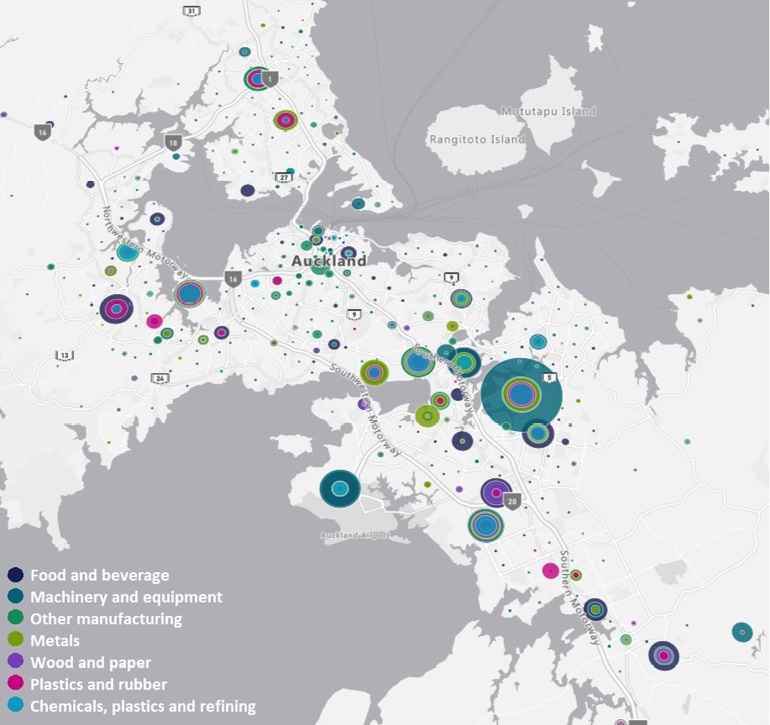
Distribution of advanced manufacturing employment in Tāmaki Makaurau Auckland (2020)
Just over half of advanced manufacturing jobs are based in Tāmaki Makaurau Auckland, where the sector accounts for 9.1% of the economy. This map shows that the jobs are concentrated in the industrial areas in South and (to a lesser degree) West Auckland.
Text description of advanced manufacturing’s share of regional employment (2021)
Text description of distribution of advanced manufacturing employment in Tāmaki Makaurau Auckland (2020)
Improving the skills and wages in the advanced manufacturing sector through the ITP will have positive impacts on communities throughout regional and urban Aotearoa New Zealand.
Advanced manufacturing accounts for 73.5% of goods exports and just over half of total goods and services exports ($44.5 billion).
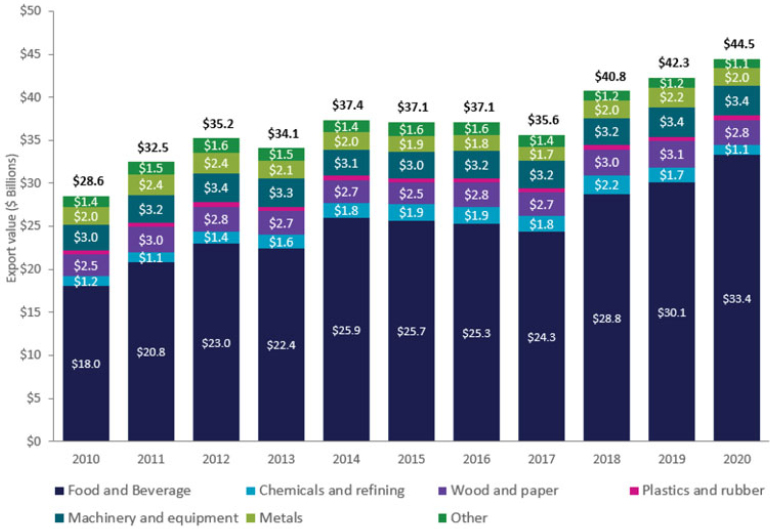
Manufactured exports by subsector (NZ$ billions, year ended February, 2010 - 2020)
Text description of manufactured exports by subsector
The largest destination markets for non-primary sector manufactured goods are Australia, the United States, China, Japan, United Kingdom, Korea, Singapore, Canada and Germany. In contrast, for primary sector manufactured goods, China is the largest export market.
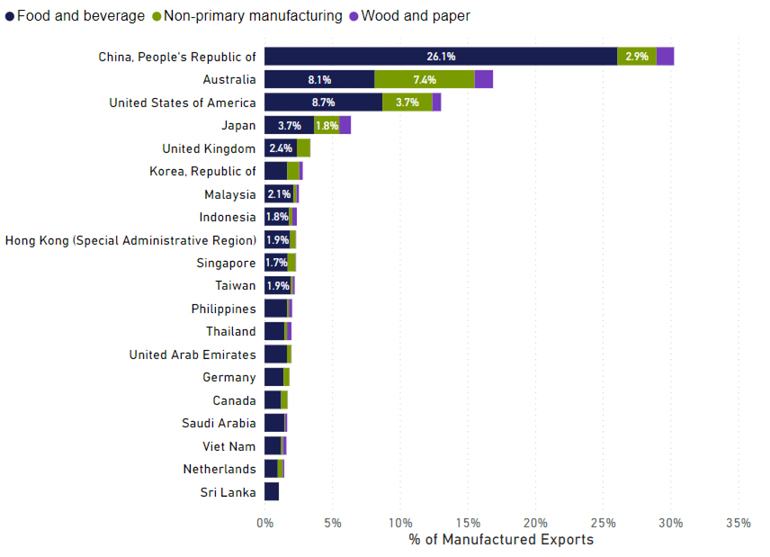
Leading export destinations for manufactured goods by broad industry group (2020)
Text description of leading export destinations for manufactured goods by broad industry group
Advanced Manufacturing has been prioritised for an ITP due its scale and the untapped potential to significantly increase productivity, higher-skilled, higher-wage jobs and a globally competitive low-emissions sector.
Two trends provide an opportunity to accelerate the growth and transformation of the sector over the next 20 years:
Aotearoa New Zealand’s advanced manufacturing sector can adapt and thrive in this changing landscape. Transformation, however, will require the right action because:
This Industry Transformation Plan is a joint project. Partnership is a driving principle and business, unions and workers, government, Māori, Pacific peoples and wider stakeholders have worked together to create this Plan.
Work on the Advanced Manufacturing ITP began in July 2020 with engagements with a range of stakeholders throughout Aotearoa New Zealand, including members of a Partnership Group, to understand the challenges and opportunities facing the sector and priorities to accelerate growth and transformation.
Since July 2021, sector representatives have participated in a Steering Group and 4 working groups to prepare the draft ITP.
There are 13 representatives from across the sector on the Steering Group which has 3 Co-Chairs:
There are 44 sector representatives on the 4 Working Groups. These groups have identified key initiatives that would accelerate the growth and transformation of advanced manufacturing. The wider sector, Māori and Pacific Peoples refined and prioritised these initiatives during extensive public consultation in 2022.
Māori play an important role in Aotearoa New Zealand’s advanced manufacturing sector, that is the second largest employer of Māori and includes 870 Māori-owned businesses. The results of the ITP are intended to help create more high-skilled high-wage work opportunities for Māori as well as support Māori-owned and Māori-led advanced manufacturing businesses.
Pacific peoples are a key voice in this ITP, particularly given their significant historical and current contributions to the sector. The sector is the second largest employer of Pacific peoples accounting for 16% of the Pacific workforce. The ITP describes the history, aspirations, concerns and needs of Pacific peoples that are acknowledged as of key significance to the transformation of the sector.
10 government agencies are also involved:
Steering group and working groups
The following 6 key priorities to drive growth and transformation of the advanced manufacturing sector have been identified:
increasing investment in advanced technologies and processes to lift productivity and wages
developing and attracting a diverse high-skilled and high-wage workforce
creating a leading sustainable circular net-zero emissions sector
making innovation, R&D and science work for advanced manufacturing
improving the understanding and perceptions of advanced manufacturing
enhancing global connectivity and opportunities
The ITP also identifies specific initiatives to drive transformation. These are included in an Action Plan along with measurable implementation actions over 1 to 3 years.
Collectively, these priorities and actions aim to achieve the sector’s long-term vision of:
A thriving Aotearoa New Zealand advanced manufacturing sector of world-class creators, innovators and makers delivering quality products, sustainable solutions and intergenerational wellbeing.
Over 700 people participated in public consultation to prioritise and refine the draft ITP in 2022 including through:
Regional workshops were held in the following locations and had 240 participants:
| Location | Date | Participants |
|---|---|---|
| Whangarei | 7 June 2022 | 10 |
| Auckland – Henderson | 8 June 2022 | 18 |
| Auckland – East Tamaki | 8 June 2022 | 31 |
| Hamilton | 9 June 2022 | 14 |
| Tauranga | 10 June 2022 | 11 |
| New Plymouth | 21 June 2022 | 24 |
| Napier | 13 June 2022 | 14 |
| Wellington | 14 June 2022 | 25 |
| Nelson | 20 June 2022 | 11 |
| Christchurch | 15 June 2022 | 51 |
| Dunedin | 16 June 2022 | 18 |
| Invercargill | 17 June 2022 | 13 |
| Total | 240 |
Recordings of the online thematic webinars can be viewed via the following links. There were 215 participants across the 6 sessions:
| Webinar recording | Date | Participants |
|---|---|---|
| Watch: Increasing investment in advanced technologies and processes to lift productivity and wages(external link) — Vimeo | 22 June 2022 | 31 |
| Watch: Making innovation, R&D and science work for advanced manufacturing(external link) — Vimeo | 29 June 2022 | 41 |
| Watch: Attracting and developing a diverse high-skilled high-wage workforce(external link) — Vimeo | 30 June 2022 | 36 |
| Watch: Creating a leading sustainable circular net-zero emissions sector(external link) — Vimeo | 5 July 2022 | 54 |
| Watch: Enhancing global connectivity and opportunities(external link) — Vimeo | 6 July 2022 | 26 |
| Watch: Improving perceptions of advanced manufacturing(external link) — Vimeo | 7 July 2022 | 27 |
| Total | 215 |
The Advanced Manufacturing ITP Steering and Working Groups included a strong worker voice, involving experienced workplace union delegates and their union representatives. The New Zealand Council of Trade Unions’ submission on the Advanced Manufacturing ITP captures extensive engagement carried out with worker representatives and highlights the ongoing engagement with key unions with an active stake in advanced manufacturing to ensure the Advanced Manufacturing ITP is addressing the long-term interests of working people.
Māori already play an important role in Aotearoa New Zealand’s advanced manufacturing sector. The sector is the second-largest Māori employer (41,900 workers representing 12.7% of the Māori workforce). The 870 Māori-owned manufacturing businesses have the third-highest average operating margin of all Māori-owned businesses.
The ITP identifies opportunities for Māori workers, businesses, rangatahi and communities through the transformation of advanced manufacturing and to take steps to create more high-skilled and high-wage work opportunities for Māori and support Māori-owned and Māori-led advanced manufacturing businesses.
Pasific peoles input is critical as the advanced manufacturing sector is the second largest employer of Pacific peoples (20,900 workers representing 16% of the Pasifika workforce). There are also approximately 130 Pasifika-owned advanced manufacturing businesses.
A dedicated Pacific peoples engagement was held on Monday 25 July at Te Oro in Glen Innes, Tāmaki Makaurau Auckland. The engagement identified opportunities and refined actions for Pacific peoples as workers, businesses and communities through transformation of the advanced manufacturing sector.
60 written submissions on the Draft ITP were received. Our thanks to all those that provided submissions that have informed the refined and prioritised final Action Plan.
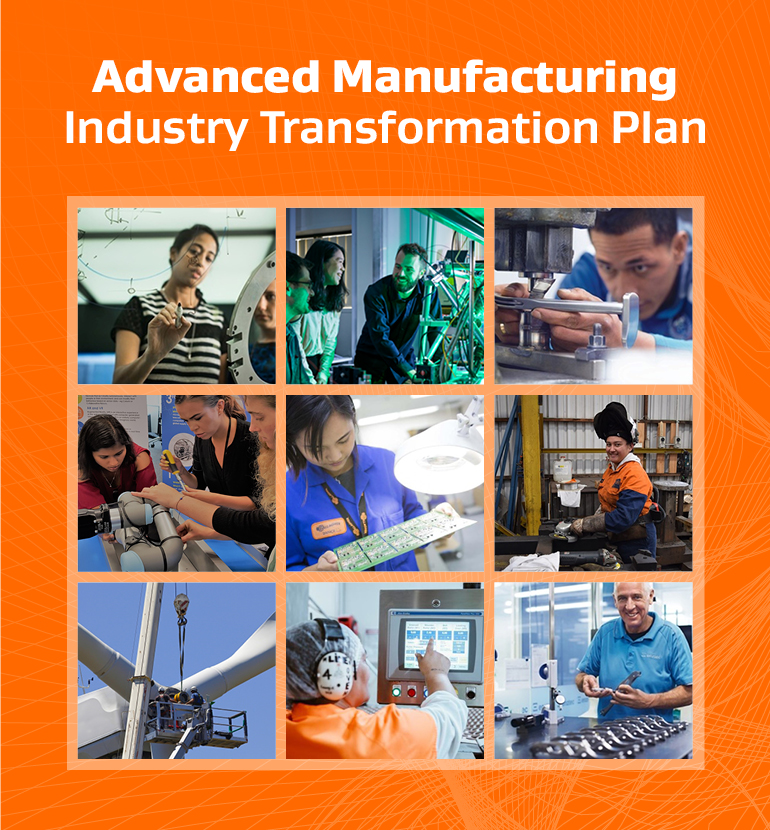
Crown copyright © 2024
https://www.mbie.govt.nz/business-and-employment/economic-development/industry-policy/industry-transformation-plans/advanced-manufacturing
Please note: This content will change over time and can go out of date.